AMRAT: Sisters United to Stop People from Being Sold
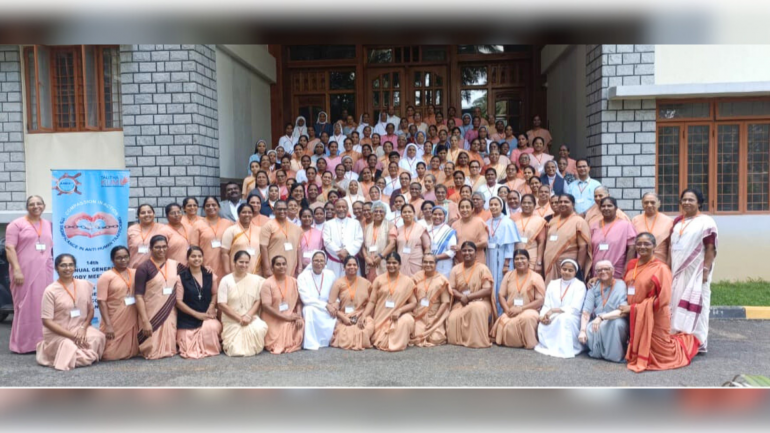
Human trafficking, or modern-day slavery, is one of the gravest violations of human dignity. In 2009, women religious in India formed AMRAT–Talitha Kum India, a Gospel-rooted network committed to prevention, protection, rescue, and rehabilitation.
Inspired by Christ’s words, “I have come that they may have life, life in its fullness” (Jn 10:10), AMRAT continues to grow as a movement of solidarity and hope for a society free from exploitation.
From Prayer to Action: The Birth of AMRAT
Sr. Jyoti Pinto BS, who initiated AMRAT in Asia and India, recalls how the movement was born from prayer and urgency. The spark came in 2007 during the Plenary Assembly of the International Union of Superiors General (UISG) in Rome. “Listening to Sr. Bernadette Sangma present the realities of human trafficking, I was shaken to the core. I began to wonder, could this evil also be present in India?” she said.
At the time, Sr. Jyoti BS was Superior General of the Sisters of the Little Flower of Bethany and Vice-President of the Conference of Women Religious of India. She connected global reports with stories of missing women and girls she had already heard. Through prayer, she felt called to act, inviting training programs to India, beginning with Raia, Goa, in 2009. A follow-up in Kolkata in 2010 officially gave the network its name: AMRAT (Asian Movement of Women Religious Against Human Trafficking).
“Five South Asian countries first joined the network; later, each formed its own Talitha Kum movement, except Nepal, which remains with AMRAT–Talitha Kum India,” said Sr. Jyoti BS.
What moved her most was the indifference she encountered. “Children were disappearing from villages while many in the Church remained unaware or in denial. Some even dismissed trafficking as ‘just another form of prostitution.’ That was very painful,” she said. Today, AMRAT unites 192 congregations and has sensitized over 12,000 sisters. “Where once we worked in isolation, today we stand together as one powerful voice for the voiceless,” Sr. Jyoti affirmed.
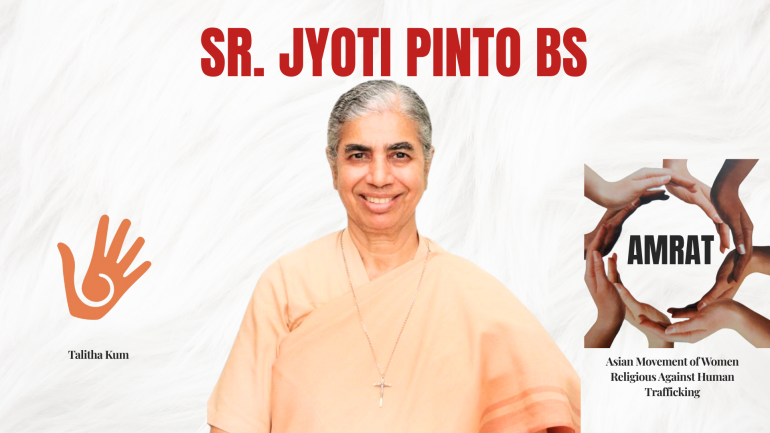
Leading the Fight Against Human Trafficking
As President of AMRAT, Sr. Meera Mathew RGS of the Congregation of Our Lady of Charity of the Good Shepherd carries forward this mission. “Our task is to strengthen the network region by region, helping sisters come together, gain skills, and deepen their commitment,” she said.
AMRAT works locally and internationally as part of Talitha Kum Asia, where coordinators share strategies to address unsafe migration, cross-border trafficking, and forced labour. “We need to move beyond ‘my own people’ to ‘our people,’” she stressed, emphasizing collaboration across cultures and borders.
The network focuses on prevention, protection, rescue, rehabilitation, reintegration, and repatriation, partnering with Anti-Human Trafficking Units, NGOs, and legal experts. Awareness and skill training prevent exploitation, while rescue and rehabilitation address urgent needs.
Sr. Meera shared moments that strengthened her resolve, defending a mother and daughter wrongly accused of murder and rescuing a 15-year-old girl sold for 60 rupees. “Every effort we make is to restore human dignity. I have heard the cry of my people, and I cannot remain a spectator,” she said. She emphasized safety for all, especially children and young women. “Any form of enslavement must be prevented and challenged. AMRAT must be a voice for life in its fullness,” she concluded.
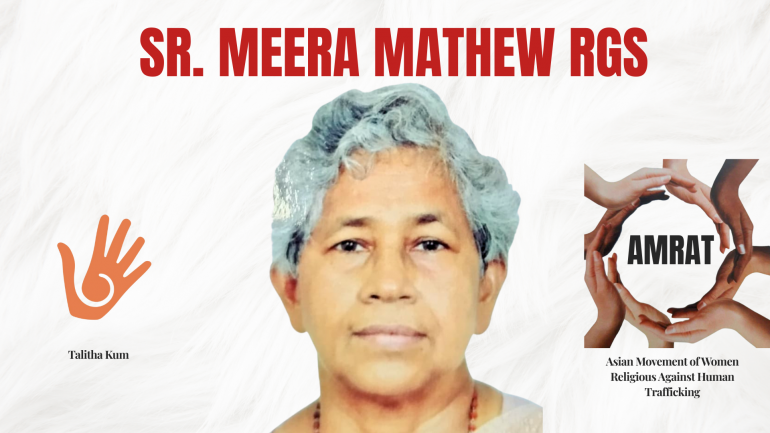
On the Frontlines: Stories from Sisters
For sisters engaged in AMRAT, trafficking is not a distant issue but a daily reality. Women, men, and children are deceived with false promises of work, education, or a better life, only to be trapped in exploitation ranging from domestic servitude and unsafe labour to sexual exploitation. Poverty, lack of education, and the longing for a better future make families especially vulnerable.
“Certain areas have become both source and destination for human trafficking. Young people brought for work are often exploited as families place their trust in middlemen, only to be betrayed,” said Sr. Crina Cardozo SFN of the Congregation of the Sisters of the Holy Family of Nazareth in Goa.
Sr. Prema Chowallur SCC, Sisters of the Cross of Chavanod, a Founding Director of Rainbow Home of Seven Sisters serving in Assam, stressed that the poor and uneducated are most at risk because, in desperation, they accept any opportunity that appears to offer a way out. [Rainbow Home of Seven Sisters is a gender-neutral home welcoming all, regardless of sexuality or gender, the first of its kind in the Catholic Church. Its offshoot, Bridge and Embrace, provides pastoral care for the LGBTQ+ community and is affiliated with the Global Network of Rainbow Catholics (GNRC).]
AMRAT responds through prevention, rescue, and rehabilitation. Awareness sessions in schools, parishes, and communities aim to stop trafficking before it begins. Rescue operations, often carried out with police and NGOs, provide a way out, while rehabilitation offers survivors shelter, skill training, and reintegration with their families. “When we are united and strong, we can create greater awareness and protect countless vulnerable lives,” noted Sr. Crina SFN, who is the Director of Fr. Faustino Social Service Institute–Divya Gyan in Goa.
For both sisters, this mission is deeply spiritual. “Working for the voiceless deepens my vocation. It is our call to serve as the Master did,” said Sr. Prema SCC. She admitted that even threats from traffickers have not shaken her conviction. “We don’t focus on what we gain. Our only aim is to give—to restore dignity and bring a smile to survivors’ faces,” reflected Sr. Crina SFN.
Sr Crina Cardozo SFN and Sr Prema Chowallur SCC are also the executive members of AMRAT.
Hope and Action: AMRAT’s Ongoing Journey
AMRAT’s journey shows how faith, commitment, and inter-congregational unity can challenge even the darkest injustices. From its founder’s vision to the present leadership and the dedication of members, the network exemplifies how sustained action rooted in compassion transforms lives. By combining awareness, advocacy, and hands-on support, AMRAT continues to restore dignity, protect the vulnerable, and inspire others to join the fight against human trafficking. Its work reminds us that where injustice thrives, courage and solidarity can light the way toward hope.





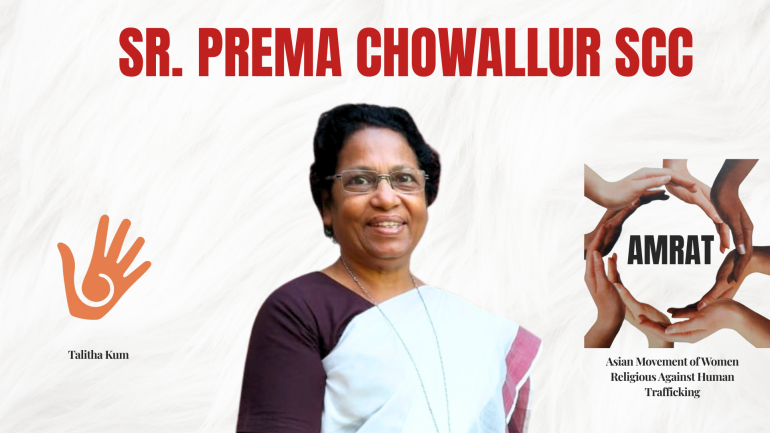
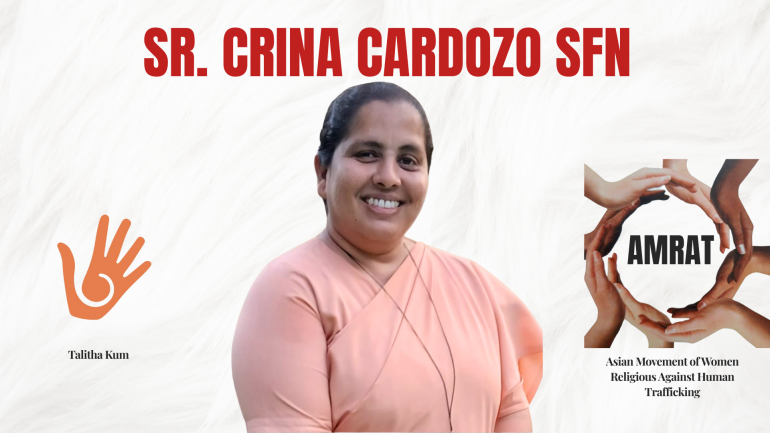





Interested
Proud of your Commitment
- Reply
Permalink